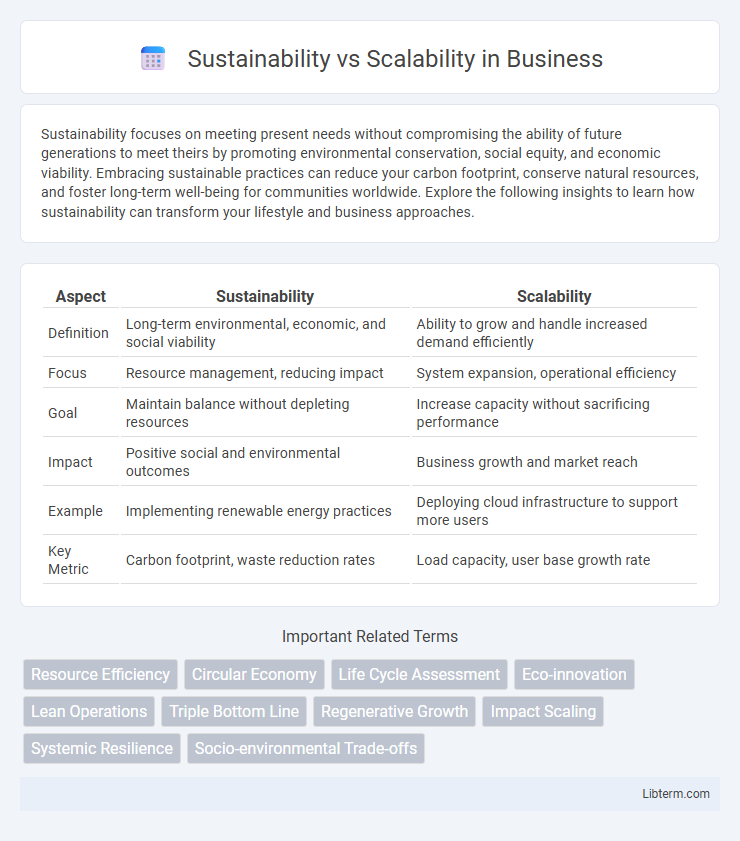Sustainability focuses on meeting present needs without compromising the ability of future generations to meet theirs by promoting environmental conservation, social equity, and economic viability. Embracing sustainable practices can reduce your carbon footprint, conserve natural resources, and foster long-term well-being for communities worldwide. Explore the following insights to learn how sustainability can transform your lifestyle and business approaches.
Table of Comparison
| Aspect | Sustainability | Scalability |
|---|---|---|
| Definition | Long-term environmental, economic, and social viability | Ability to grow and handle increased demand efficiently |
| Focus | Resource management, reducing impact | System expansion, operational efficiency |
| Goal | Maintain balance without depleting resources | Increase capacity without sacrificing performance |
| Impact | Positive social and environmental outcomes | Business growth and market reach |
| Example | Implementing renewable energy practices | Deploying cloud infrastructure to support more users |
| Key Metric | Carbon footprint, waste reduction rates | Load capacity, user base growth rate |
Understanding Sustainability and Scalability
Sustainability refers to a system's ability to maintain its operations and impact over the long term without depleting resources or causing harm to the environment and society. Scalability measures how effectively a system or business can grow in size, output, or impact without compromising performance or quality. Understanding both concepts is crucial for designing solutions that can expand efficiently while remaining environmentally and economically viable.
Key Differences Between Sustainability and Scalability
Sustainability focuses on maintaining business operations long-term by managing resources efficiently and minimizing environmental impact, ensuring enduring value generation. Scalability emphasizes the ability to increase output or expand market reach rapidly without compromising performance or quality. Key differences lie in sustainability's goal of resilience and responsible growth versus scalability's aim for exponential growth and capacity expansion.
Why Sustainability Matters in Business Growth
Sustainability is crucial in business growth because it ensures long-term resource availability, minimizes environmental impact, and strengthens brand reputation, which attracts eco-conscious consumers and investors. Unlike scalability that focuses on rapid expansion, sustainability prioritizes ethical practices and social responsibility, reducing risks associated with regulatory penalties and market volatility. Integrating sustainability into business models fosters resilience, enabling companies to adapt to changing market demands while maintaining profitable operations.
The Importance of Scalability for Expansion
Scalability is crucial for business expansion as it allows companies to increase output and manage growing demand without compromising performance or quality. Efficient scalability ensures the ability to adapt infrastructure and resources dynamically, supporting long-term growth and market reach. Prioritizing scalable solutions enables enterprises to optimize costs and enhance operational efficiency while expanding into new markets.
Challenges in Balancing Sustainability and Scalability
Balancing sustainability and scalability presents challenges such as resource allocation conflicts, where sustainable practices often require slower growth and higher upfront costs, potentially limiting rapid expansion. Companies struggle to maintain environmentally friendly operations while scaling efficiently, as increased production can lead to higher emissions and waste. Integrating sustainable technologies at scale demands innovation and significant investment, which can be challenging for organizations aiming for quick market penetration.
Strategies to Achieve Sustainable Scalability
Achieving sustainable scalability requires integrating eco-friendly practices with growth-oriented strategies such as efficient resource management, renewable energy adoption, and waste reduction. Leveraging technology innovations like automation and data analytics optimizes operational processes while minimizing environmental impact. Prioritizing stakeholder engagement and transparent reporting fosters long-term commitment to both scalability and sustainability goals.
Case Studies: Success Stories and Failures
Examining case studies reveals how companies like Patagonia achieve sustainability by integrating eco-friendly practices with long-term profitability, while firms such as Theranos highlight scalability failures due to compromised ethics and operational shortcuts. Tesla exemplifies scalability success by rapidly expanding electric vehicle production despite facing sustainability critiques over resource usage. These examples underscore the critical balance between maintaining sustainable practices and achieving scalable growth for enduring business success.
Measuring Success: Metrics for Sustainability and Scalability
Measuring success in sustainability involves tracking metrics such as carbon footprint reduction, resource efficiency, and long-term environmental impact. Scalability success is evaluated by metrics like user growth rate, infrastructure adaptability, and cost per acquisition during expansion phases. Integrating both sets of metrics provides a comprehensive view of a project's ability to grow responsibly without depleting resources or compromising future viability.
The Role of Innovation in Harmonizing Both Goals
Innovation drives the integration of sustainability and scalability by developing eco-friendly technologies that enhance resource efficiency while supporting business growth. Breakthroughs in renewable energy, circular economy models, and smart manufacturing enable companies to scale operations without compromising environmental responsibility. This balance fosters long-term profitability and global impact, aligning market expansion with sustainable development goals.
Future Trends in Sustainable and Scalable Business Models
Emerging future trends in sustainable and scalable business models emphasize integrating circular economy principles and renewable energy adoption to minimize environmental impact while supporting growth. Advanced data analytics and AI-driven optimization enable companies to scale operations efficiently without compromising sustainability goals. Stakeholders increasingly demand transparency and social responsibility, driving innovations in eco-friendly supply chains and scalable green technologies.
Sustainability Infographic

 libterm.com
libterm.com